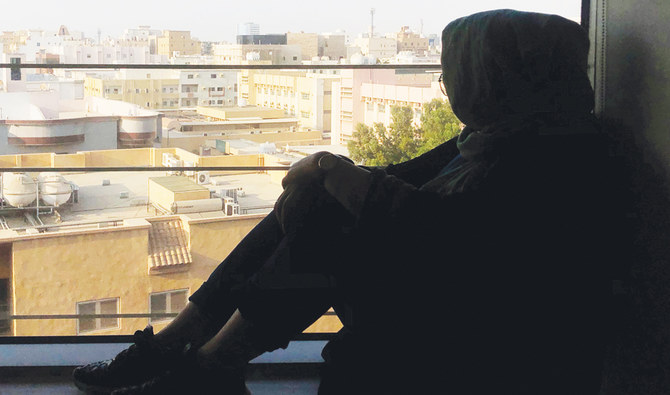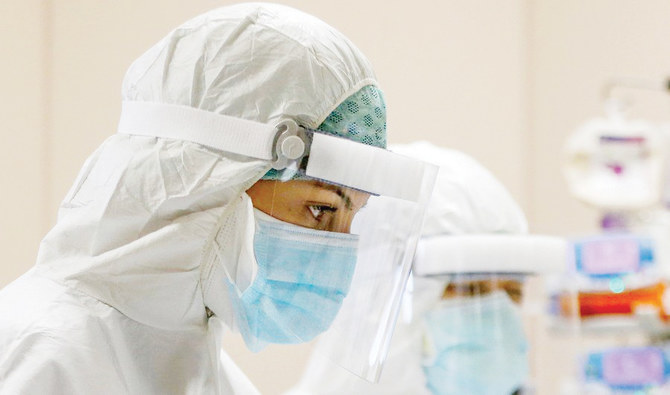RIYADH: Despite an increase in the number of deaths from the coronavirus disease (COVID-19), the recovery rate is relatively high. While there are carriers with mild or no symptoms at all, others have no choice but to seek treatment at the hospital.
Arab News talked to a Saudi woman who caught the disease while she was isolated with her family, with 11 members in the house also infected. Their symptoms ranged from mild to severe.
Khuloud Mullah, 43, who works in the diplomatic sector in Riyadh, visited her family in Yanbu before the nationwide curfew was put in place.
“It all started before the government issued the curfew order, when my brother-in-law went to a weekend getaway (isteraha) and was joined by other men who just came from abroad and carried the coronavirus without knowing,” she said.
“Unfortunately, the disease spread to four houses, two in Riyadh, one in Yanbu and one in Madinah, and the members of these houses all tested positive for COVID-19.”
During her recovery journey, Mullah said she learned and discovered many things while at the hospital struggling with her illness. “For the first time, I feel the true values of the blessings I have and I wanted to share them with everyone.”
The blessing of health cannot be compared to any other blessing, she said, adding that there were moments she felt that her death was close. “He (Allah) will hold me accountable for this blessing, whether I take care of my health or neglect it.”
The blessing of freedom was also something Mullah felt while in quarantine. She started to appreciate all the things she took for granted before the virus outbreak.
“(Before COVID-19) I was free to go out, enter, decide, discuss, express, travel, change … and do whatever I wanted. And in one moment everything was taken away from me. I became trapped in a bed, imprisoned in a hospital room. It was not my choice or my decision, but forced on me for the first time in my life,” she said.
The third lesson Mullah learned from this experience was practicing patience in the midst of a painful journey.
Fighting the disease for two weeks, Mullah said that some of the symptoms that she and her family suffered from included “losing the sense of taste and smell, lack of appetite to eat, instability when walking or standing, always falling to the ground whenever walking, high fever, severe pain in the body … very severe and constant headaches, shortness of breath where I couldn’t fill my lungs.”
HIGHLIGHTS
• Khuloud Mullah caught the disease while she was isolated with her family, with 11 members in the house also infected. Their symptoms ranged from mild to severe.
• She learned that the blessing of real relationships is priceless regardless of the differences and conflicts which disappear during crisis.
• Mullah has left the hospital and is now in a hotel until she fully recovers before she can come into contact with other people.
Although she tried to force herself to eat, Mullah said everything she ate and drank “tasted like iron rust.”
She said that she resisted the pain and constant dizziness, and tried to move around her hospital room whenever she could.
“I was struggling and trying to move despite the constant feeling of dizziness. I also tried to fight the headaches by taking painkillers and drinking a lot of water and fluids. I was practicing breathing exercises even though it was painful. All these pains took me 14 days to heal, I was patient,” she added.
Mullah mentioned that the only thing that kept her strong during her illness was the presence of her family and siblings who supported her despite going through the same struggle. “
I could see their pain and yet they were resisting to care for each other.”
She learned that the blessing of real relationships is priceless regardless of the differences and conflicts which disappear during crisis. “You find them standing next to you at the time of hardship and when you need them the most, especially in your illness.”
She said that all the unprecedented changes imposed on the world since the virus outbreak reminded people that they can adapt to any unforeseen circumstances life brings them face to face with.
She added: “Whoever was infected with coronavirus will relate and understand what I am saying because they have certainly gone through the period of reflection that I have been through during my illness.”
Mullah has left the hospital and is now in a hotel until she fully recovers before she can come into contact with other people.

















